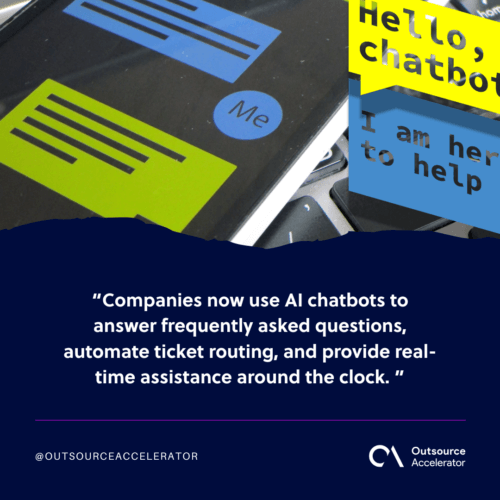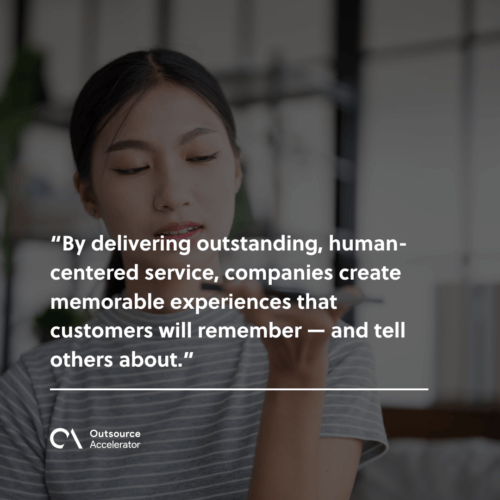Why people-powered customer support is still the gold standard in a digital world

You see it everywhere now: AI chatbots popping up, self-service websites promising instant help. Tech’s definitely shaking up customer service.
But even with all this automation, there’s still something special about talking to a real person, right? That human touch – the empathy, the understanding you can’t fake – that’s still the best way to really connect with customers and build that trust.
Machines can be fast, but they can’t be human.
This article dives deeper into why that personal connection remains the cornerstone of exceptional customer support in today’s digital age.
Looking for reliable customer support that’s augmented with digital CX solutions? Helpware is here to assist.
Customer support in the digital age
Digital tools have undoubtedly reshaped customer support. Companies now use AI chatbots to answer frequently asked questions, automate ticket routing, and provide real-time assistance around the clock.
Customers can get basic answers faster than ever, and businesses can manage higher volumes without dramatically increasing headcount.
But while digital support improves speed and scalability, it doesn’t always meet customers’ deeper needs.
When issues are complicated, emotions are high, or personalization matters, customers still turn to people. This is because at the heart of every transaction is a relationship, not just a task to be completed.

Limitations of digital-only customer support
While automation has its place, relying solely on digital customer support comes with serious limitations:
1. Lack of emotional intelligence
AI may recognize keywords and suggest pre-programmed answers, but it cannot truly understand a customer’s frustration, concern, or urgency. Emotional intelligence — the ability to perceive, interpret, and respond to emotions — is critical when handling sensitive or high-stress situations.
Only a trained human support agent can adapt tone, offer reassurance, and navigate emotionally charged conversations effectively.
2. Inability to handle complex, nonlinear issues
Most AI systems excel at handling simple, repetitive questions. But when customers bring unique or complicated problems that don’t fit neatly into predefined categories, digital support often falls short.
Bots can get stuck in loops, offer irrelevant solutions, or escalate frustrations. In contrast, people can think critically, ask clarifying questions, and adapt their approach in real time.
3. Impersonal interactions that erode loyalty
Customers don’t just want fast answers — they want to feel seen, heard, and valued. Automated responses often feel cold and generic, making customers feel like just another number.
Over time, impersonal service can erode brand loyalty, drive customers to competitors, and damage a company’s reputation.
Many experts agree that a hybrid approach of new tools with trained staff is the best formula.
The benefits of people-powered customer support
Human support doesn’t just fill in the gaps where technology fails — it actively drives stronger customer experiences. Here’s how:
1. Empathy and genuine connection
People can listen, understand context, and respond with compassion. This human element creates a sense of trust and emotional connection that digital tools simply can’t replicate. When customers feel cared for, they’re more likely to stay loyal to the brand.
2. Personalized service tailored to individual needs
Every customer is different. A skilled support agent can adapt their communication style, solutions, and pace based on each customer’s preferences and emotions.
This level of personalization makes customers feel truly valued and deepens their relationship with the brand.
3. Real-time critical thinking and problem solving
Human agents can troubleshoot complex, multi-layered issues without relying on pre-scripted responses.
They can pivot when a customer’s needs change mid-conversation, spot inconsistencies, and escalate issues appropriately, delivering outcomes faster and more accurately than automated systems.
4. Cultural sensitivity and localized support
Global customers expect more than just language translation — they expect cultural understanding.
Human agents ensure that support is not only accurate but also culturally appropriate and respectful, creating a more inclusive customer experience. This is achieved through the cultural intelligence they bring to their interactions.
5. Building customer loyalty through human touchpoints
A great support interaction can turn a frustrated customer into a brand advocate. By delivering outstanding, human-centered service, companies create memorable experiences that customers will remember — and tell others about.

Why Helpware stands out in people-powered customer support
Helpware places people at the center of its operations. The company believes technology should empower, rather than replace, human interactions.
Therefore, its Digital Customer Experience services integrate top-tier tools with highly trained, empathetic support teams that function as an extension of the client’s brand.
Through their Human-in-the-Loop services, Helpware ensures that even AI-driven processes are supervised by real individuals, maintaining quality, context, and compassion.
Whether handling complex inquiries, resolving emotionally sensitive issues, or providing multilingual support worldwide, Helpware’s teams are structured to meet the client’s customers’ expectations at every interaction.
If you’re ready to enhance your customer support with a people-focused team that understands the synergy between technology and human connection, contact Helpware now.







 Independent
Independent




